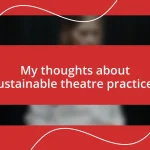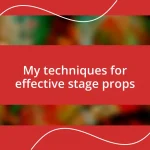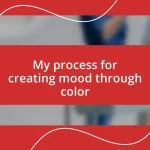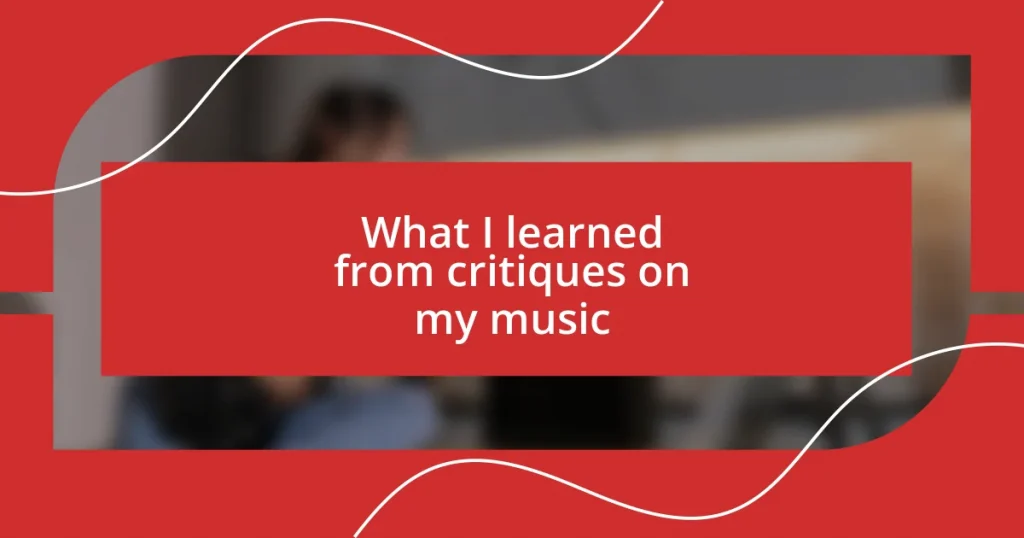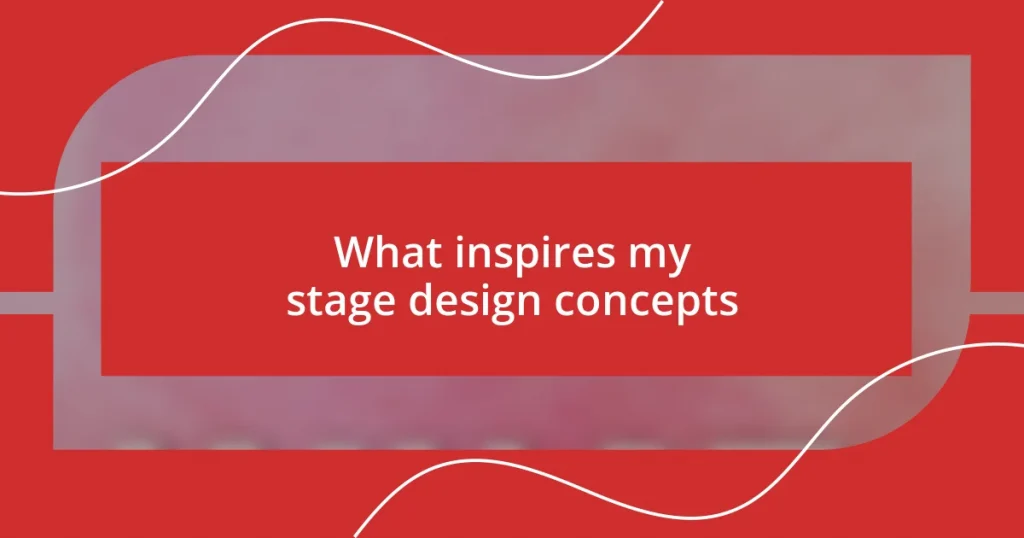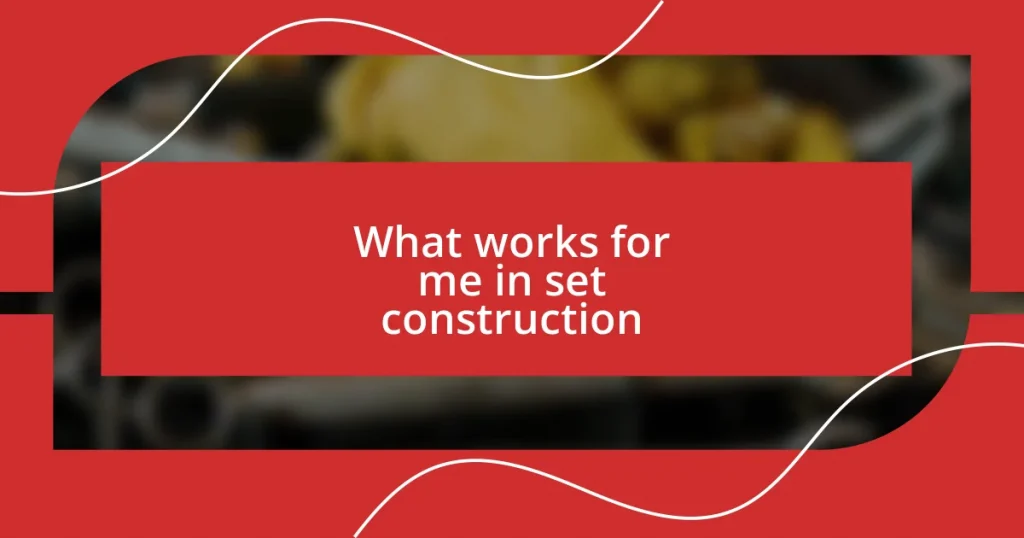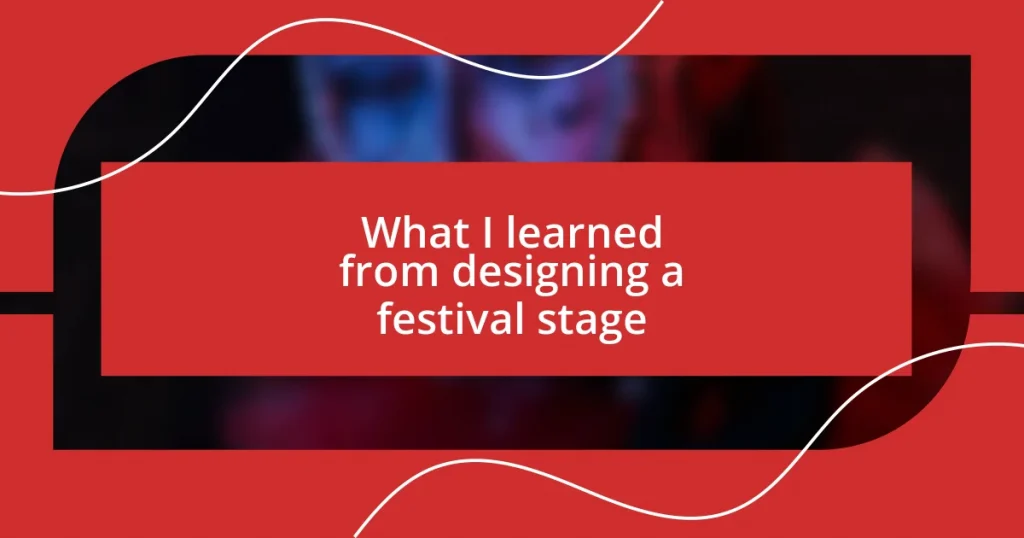Key takeaways:
- Embracing critiques is essential for growth, as they help identify blind spots and encourage deeper emotional expression in music.
- Identifying patterns in feedback enables musicians to make informed adjustments, leading to a more refined and engaging sound.
- Incorporating critiques into the creative process not only enhances musicality but also facilitates personal evolution and exploration of new ideas.
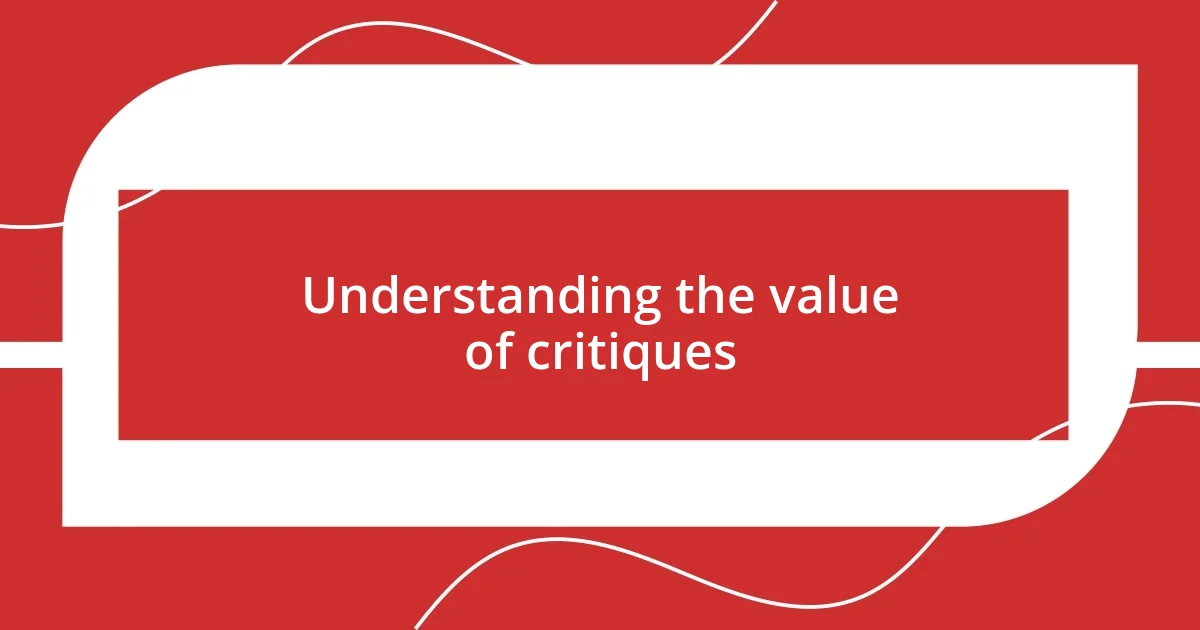
Understanding the value of critiques
Critiques have a unique way of shining a light on the blind spots we often miss in our own work. I remember the first time I played one of my songs in front of a crowd and received feedback that was surprisingly tough to swallow. At first, I felt defensive, but looking back, I realized those comments were pivotal; they helped me grow as a musician.
I often find myself reflecting on specific pieces of feedback that stung. For example, a fellow songwriter pointed out that my lyrics lacked depth. Initially, I was hurt, but it pushed me to explore my emotions more critically and expand my songwriting techniques. Isn’t it fascinating how the harshest critiques can sometimes lead us to uncover hidden layers in our creativity?
The process of receiving critiques is like standing in front of a mirror; it’s uncomfortable but necessary. Recently, I had a mentor listen to my latest track, and her suggestions were spot-on, zeroing in on what needed improvement. It reminded me that true growth often demands vulnerability, where we must allow ourselves to be exposed and open to transformation.
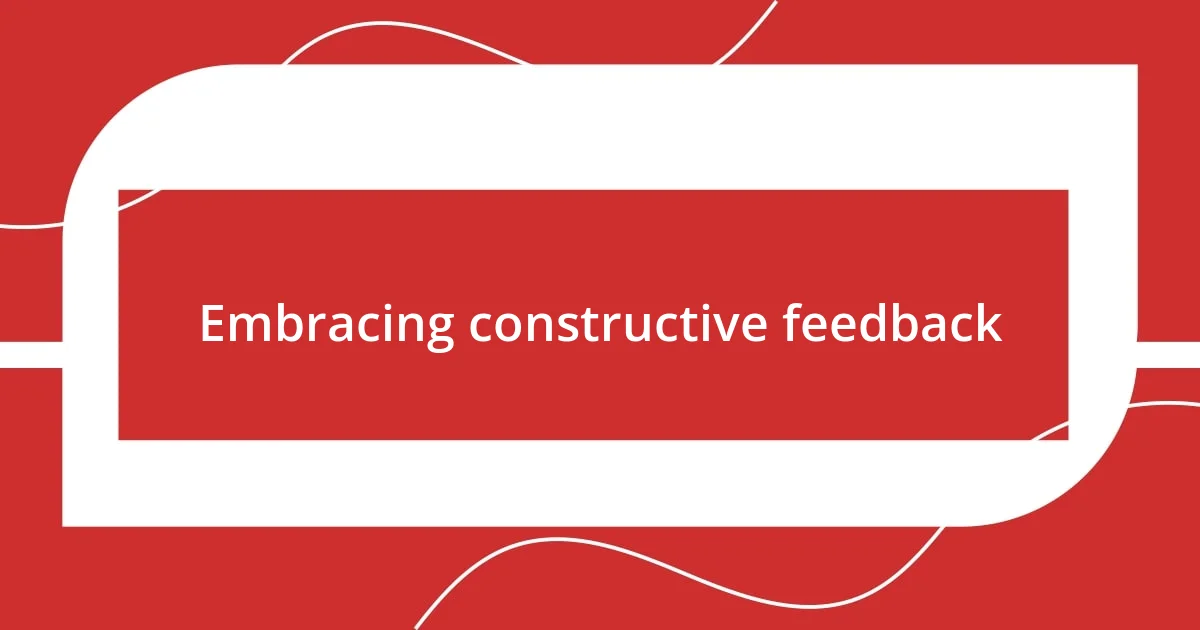
Embracing constructive feedback
Embracing constructive feedback can feel like a rollercoaster ride. There was a time when a fellow musician suggested my melody was too repetitive. At first, I bristled at the criticism, but after taking a breath, I realized it was a valuable perspective. I began experimenting with variations, and it opened up a whole new world of creativity for me, teaching me that flexibility is crucial in making music that resonates.
When I reflect on the moments where feedback has challenged me, there are certain takeaways that stand out. Here’s what I’ve learned:
- Listen actively: It’s easy to dismiss feedback, especially when it feels harsh. Instead, I’ve found it’s essential to listen and truly absorb what’s being said.
- Separate the emotion from the critique: Initial reactions can cloud judgement. Stepping back helps in processing the feedback more constructively.
- Be grateful for honesty: I’ve learned to appreciate those who give real critiques; their honesty ultimately helps me grow.
- Use feedback as a learning tool: Constructive criticism has become my secret weapon, providing insights that push my craft to new heights.
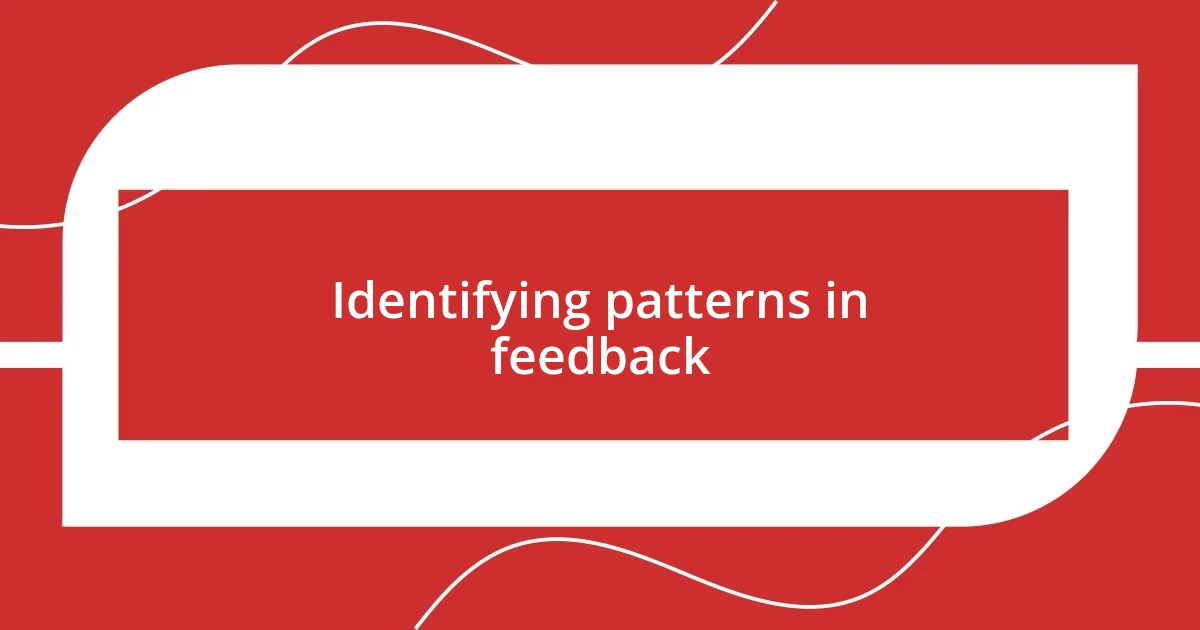
Identifying patterns in feedback
Identifying patterns in feedback is a crucial step in my growth as a musician. When I comb through the critiques I’ve received over time, I’ve started to notice certain trends. For instance, multiple reviewers have commented on my tendency to rely on familiar chord progressions. Initially, I brushed off this observation, thinking it was just a personal style choice. However, as I examined this feedback more closely, I realized that it was indeed a pattern that I needed to address to evolve my sound.
Sometimes, the patterns emerge in surprising ways. I remember when a couple of trusted friends pointed out similar issues in my song structures, specifically that my verses felt too long. This echoed a realization I had during a songwriting workshop where an instructor challenged me to tighten my lyrics. Combining these insights helped me create a tighter, more engaging listening experience. It’s almost as if the universe was sending me a message, urging me to refine my craft.
By keeping a detailed journal of the feedback I collected, I noticed recurring words and phrases that reappeared across different critiques. This practice has become invaluable. When several people highlight the same aspect, it’s a signal that I should focus on that area. Reflecting on these patterns allows me to make informed adjustments, transforming critiques into actionable steps for improvement.
| Feedback Type | Common Comments |
|---|---|
| Song Structure | Verses are too lengthy |
| Music Style | Chord progressions feel repetitive |
| Lyric Depth | Lyrics lack emotional depth |
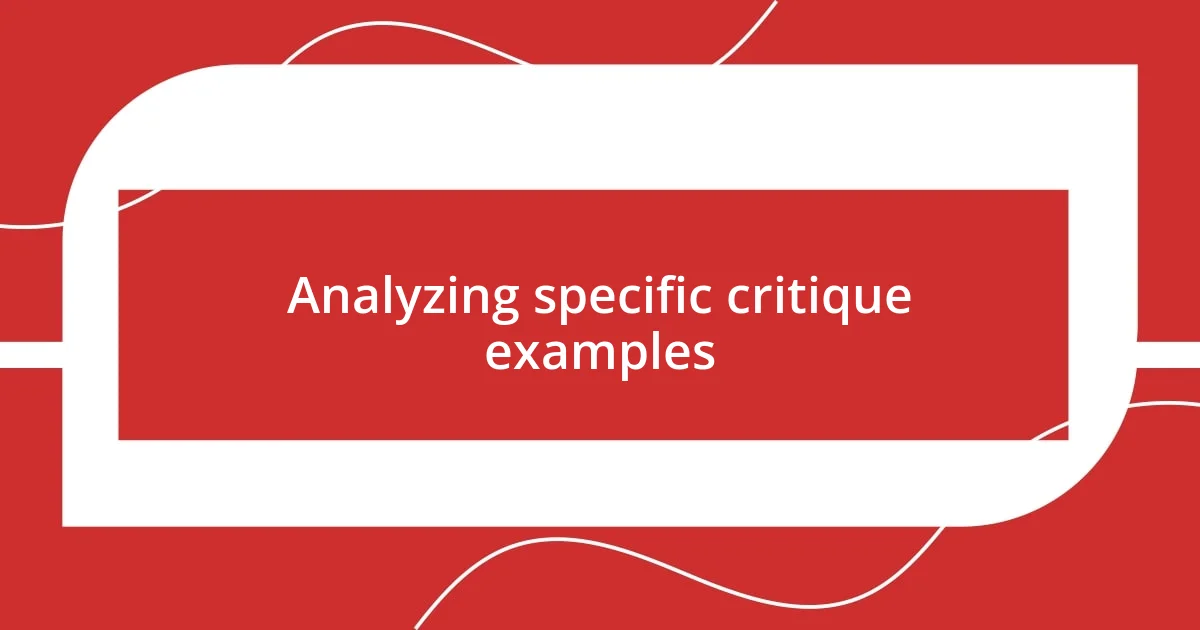
Analyzing specific critique examples
When examining critiques, I often find that some comments hit harder than others. For example, I once received feedback that my lyrics felt too surface-level and lacked emotional depth. Initially, I was defensive; who wants to think their heartfelt expressions are anything but genuine? Yet, as I reflected on this, I began to question whether I was truly connecting with my audience. Diving deeper into this feedback led me to write more personal and vulnerable lyrics, which ultimately transformed my songwriting.
There have also been critiques regarding my song structures. I distinctly recall a particularly insightful comment from a music teacher who described my verses as “endless.” That struck a chord with me. The thought of overextending my verses felt almost sacrilegious at first, but I realized it opened a door to better pacing. The journey of revisiting these song structures taught me that brevity often enhances impact—it’s a lesson I still cherish.
As I look back on these critiques, I can’t help but ask myself: what if I hadn’t paid attention? The fear of facing harsh judgments nearly held me back, but embracing these insights has been transformative. I’ve come to value each critique as a stepping stone—a catalyst for deeper connections with my listeners and a more refined sound. Recognizing the emotional honesty within those comments has undoubtedly reshaped my music, making it a journey I am grateful to undertake.
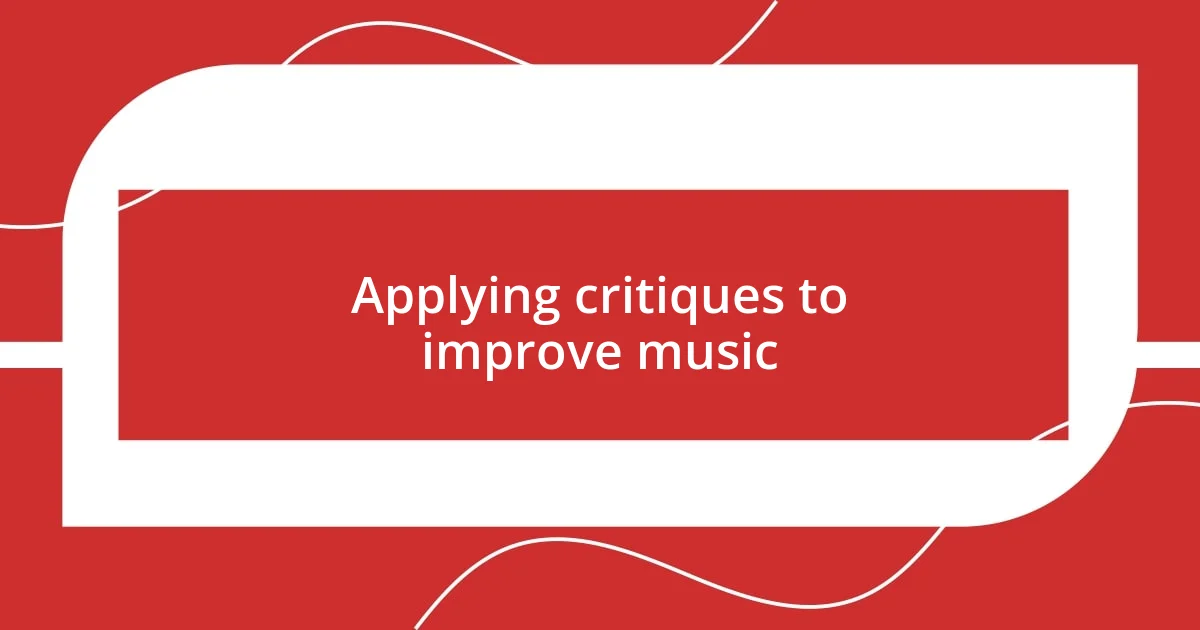
Applying critiques to improve music
When I started implementing critiques into my music-making process, I quickly realized how powerful a single suggestion could be. I remember one reviewer compared my choruses to a repetitive loop—this struck me hard. Rather than dismiss it, I tried experimenting with varying melodies and rhythms in my choruses, which breathed fresh air into my songs and made them more memorable. It was as if I had discovered a whole new dimension to my music.
Another time, I received constructive criticism about my instrumentation choices. A fellow musician mentioned that my arrangements felt crowded, which initially made me frustrated. But that frustration turned into curiosity. I decided to strip back my layers, allowing the sound to breathe. I didn’t just change my approach; I rediscovered the beauty of simplicity. Suddenly, the focus was not just on the notes but on the emotional message behind them.
It’s fascinating how critiques can double as a mirror reflecting our creative habits. When multiple comments pointed out the lack of varied dynamics in my songs, I couldn’t ignore the message any longer. I experimented with volume swells and transitions, creating a more dynamic soundscape. This shift didn’t just elevate my music; it made me feel like I was on a mission of self-discovery, learning more about my own style along the way. Have you ever felt that moment where a small change made an enormous difference? It’s exhilarating, isn’t it?
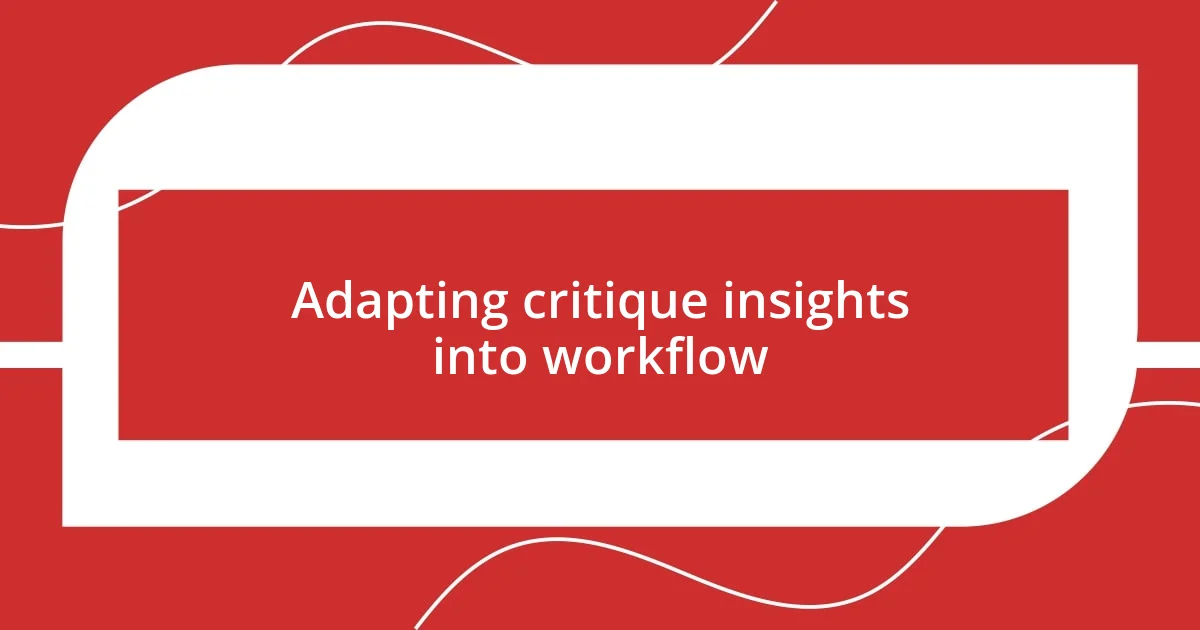
Adapting critique insights into workflow
Once I realized the need to incorporate critique insights into my workflow, everything shifted. One notable moment was when a mentor encouraged me to define my creative vision more clearly. Initially, I felt overwhelmed by the request—how could I distill my artistic intent into a few words? However, after mulling over this, I found that articulating my vision directly influenced my song choices and arrangements. My creations began to feel more cohesive, as if each piece was a chapter in a larger narrative.
A pivotal experience for me came when I started maintaining a critique journal. This was more than just a place to jot down feedback; it became a vital tool for introspection. I noticed that when I wrote down comments, my reactions ranged from elation to irritation. Identifying those emotional triggers helped me understand my insecurities as an artist, and rather than shying away from them, I leaned in. How often do we let our feelings control our creative direction? In my case, recognizing these emotions transformed my pieces into authentic expressions of my journey.
I’ve learned that adapting critiques isn’t just about adjustments in music; it’s a deeply personal evolution. There was a time I hesitated to collaborate because I feared judgment. However, when a fellow artist suggested we co-write, I realized this was an opportunity to blend our unique sounds. The experience opened my eyes to a rich tapestry of musical ideas, ultimately leading to tracks I never would have created in isolation. Have you ever taken a leap into a collaboration, only to find it enriches your work beyond expectation? I now embrace that uncertainty, knowing it can lead to beautiful discoveries.
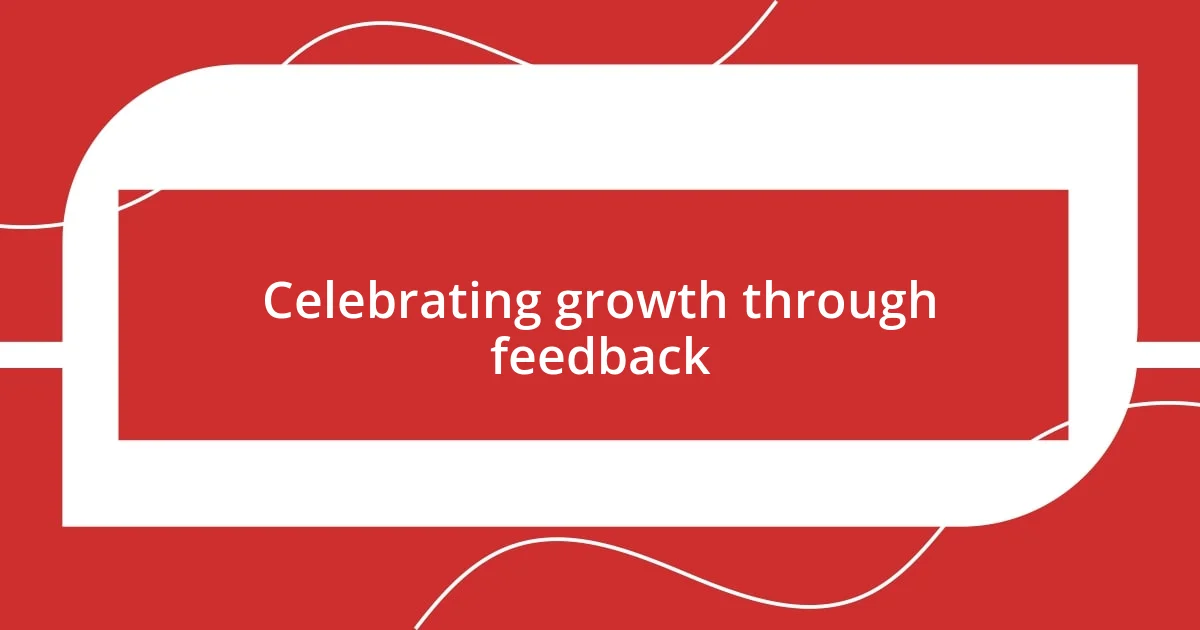
Celebrating growth through feedback
Feedback can feel daunting, yet it’s a fantastic catalyst for growth. I recall a time when a friend pointed out the emotional depth—or lack thereof—of one of my tracks. She described it as “nice but unfeeling.” At first, I was taken aback. Yet, that stark observation pushed me to dig deeper into my intent. I played with lyrical storytelling, tapping into experiences that resonated with my more vulnerable self. Suddenly, my music transformed into an echo of my emotions rather than just a collection of sounds.
One feedback session led to a remarkable revelation about my perception of failure. A peer noted that I often shy away from experimenting with unconventional structures. I initially felt defensive, thinking innovation meant chopping ideas to pieces. Instead, that comment nudged me to explore. I later crafted a song that flipped the usual verse-chorus format, embracing unexpected transitions. The freedom I felt—wow! It was like stepping outside of my comfort zone and dancing for the first time. Isn’t it interesting how criticism can unlock adventurous creativity?
As I celebrate my growth through feedback, I notice how it weaves into my identity as a musician. There are moments when I hear a critique and my heart races, caught between self-doubt and determination. I vividly remember a reviewer suggesting I play with silence more. Initially terrified by the notion, I embraced the challenge. By incorporating pauses into my compositions, I found they added tension and anticipation—transforming a straightforward piece into something that truly captivated the listener. Have you ever experienced that thrill of experimenting with an idea that once intimidated you? I think it’s exhilarating to see how feedback paves the way for discovering new facets of ourselves as artists.




